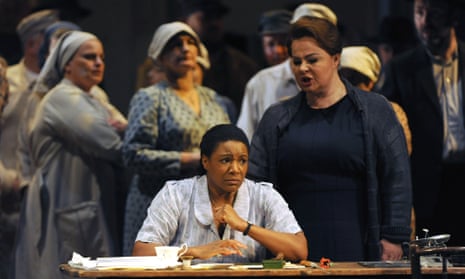Leoš Janáček’s opera, turning on the central story of infanticide, is never anything but anguished and achingly sad. Now, with the sharp focus brought by the present times and the knowledge of atrocities being perpetrated in Ukraine, this Welsh National Opera revival of their 1998 production took on a powerful emotional force. Addressing the audience before it began, conductor and company music director, Tomáš Hanus, spoke movingly about the essential humanity of Janáček’s work and of the shared privilege of experiencing this in the face of the tragedy of war. The intensity he inspired in orchestra and singers spoke volumes.
Director Katie Mitchell’s concept has always carried an uneasy tension. Underlining the claustrophobia of a tight-knit community, the mill-owner Grandmother Buryja and her daughter-in-law, the village sacristan, the Kostelnička, represent the two conditioning but stultifying elements of everyday village-life, work and religion. Both women see Jenůfa – granddaughter of one, stepdaughter of the other – as the single person who will create balance, but the complication is that she is pregnant by Steva, heir to the mill, loved by his half-brother, Laca. It is the latter who, in a moment of frenzied jealousy, slashes Jenůfa’s face. But the deeper scar is the death of baby Stevushka, murdered by the Kostelnička in the mistaken belief that she can right wrongs.
With Elizabeth Llewellyn in the title role, it is Jenůfa’s intrinsic goodness that emerges so convincingly: her singing had great poise and lyrical line, she coloured the tenderness and compassion of her character, her agony at Stevushka’s loss simply heart-rending. That goodness, which Laca has actually always understood, is the agent for their ultimate love, the redeeming humanity to which Hanus referred. It is perhaps to the final optimism of Gabriela Preissová’s original novel that Mitchell’s enigmatic closing tableau alludes, with the backdrop rising to show a child of Jenůfa’s greeting its grandmother, the now re-habilitated Kostelnička.
Peter Berger was an impassioned Laca, yet with tiny gestures of solicitousness carefully observed, and Rhodri Prys Jones a strong if unlikable Steva. Eliška Weissová’s Kostelnička was a formidable figure, her fine soprano blazing first with the certainty of her conviction that she had Jenůfa’s wellbeing at heart, and then with the bitter remorse on admission of her crime. This was a wholly compelling performance from cast, chorus and orchestra alike, embracing such empathy and commitment as to leave its audience deeply moved and more than a bit drained.
At the WMC, 12 and 18 March, then touring until 10 May.
